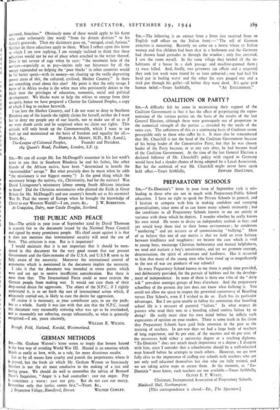PREPARATORY SCHOOLS
SIR,—" Ex-Dominie's " letter in your issue of September t5th is mis- leading to those who are not in touch with Preparatory-Public School education. I have no right to speak for Private Schools in general, and I hesitate to compete with him in making confident and sweeping generalisations, since none of us can know many schools intimately ; but the conditions in all Preparatory Schools known to me are utterly at variance with those which he depicts. I wonder whether he really knows his own mind. He seems to desire an independent outlook in boys and yet would keep them tied to their home environment ; he condemns " mothering " and yet accuses us of countenancing " bullying." Moit of us believe that one of our merits is that we hold an even balance between kindliness and toughness: we bestow the care which is vital to young boys, encourage Christian forbearance and mutual helpfulness, we tend and nurture a boy's sensitiveness, and yet we promote courage, &termination, the spirit of adventure and hardiness. Has it occurred to him that rhany of the young men who have stood up so magnificently to the test of war are .products of our schools?
In every Preparatory School known to me there is ample time provided, and deliberately provided, for the pursuit of hobbies and for the develop- ment of independence. In none of them is there one tithe of the " dirty talk " prevalent amongst groups of boys elsewhere. And the preparatory schoolboy of the present day just does not know what bullying is. You could not allow me space to reopen the perennial controversy of Boarding versus Day Schools, even if I wished to do so. Each has its particular advantages. But I am quite unable to follow his contention that boarding school life is a measure of parental " failure." In what respect do parents who send their sons to a boarding school confess failure by so doing? He really must clear his own mind before he inflicts such expressions of opinion on your readers. There is some truth in his claim that Preparatory Schools have paid little attention in the past to the training of teachers. In pre-war days we had a large body of teachers of long experience, and 8o per cent. of the masters and 66 per cent. of the mistresses held either a university degree or a teaching diploma.
" Ex-Dominie " doea not attach much importance to a degree ; I disagree with him, since I consider that a schoolmaster should be •a well-educated man himself before he attempts to teach others. However, we are now fully alive to the importance of staffing our schools with teachers who are not only well educated themselves but also who are fully trained, and we are taking active steps to secure them. At the moment, as " Ex- Dominic " must know, such teachers are not available.—Yours faithfully, OLIVER E. P. WYATT, Chairman, Incorporated Association of Preparatory Schools. Maidwell Hall, Northampton.
[This correspondence is closed.—En., The Spectator.]


























 Previous page
Previous page